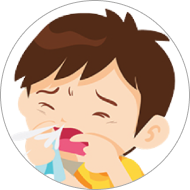Allergies Asthma
Sleep dysfunctions in children can have a significant relationship with the development or worsening of allergies and asthma. Here’s how they are interlinked:
- Inflammation Connection
- Weakened Immune System
- Airway Obstruction
- Allergies Affecting Sleep
- Asthma and Nocturnal Symptoms
- Impact on Cognitive and Physical Health
- Chronic Fatigue and Behavior
Addressing sleep dysfunctions in children, whether through medical intervention (like treating sleep apnea) or improving sleep hygiene, can help reduce inflammation and potentially ease the severity of allergies and asthma. Proper treatment of allergies and asthma is equally crucial to avoid worsening sleep issues.
Sleep dysfunctions in children can have a significant relationship with the development or worsening of allergies and asthma. Here’s how they are interlinked:
1. Inflammation Connection
- Allergies and Asthma: Both allergies and asthma involve inflammation in the body. Allergic reactions trigger the immune system to respond to allergens (like pollen, dust mites, or pet dander) with inflammation, which can affect the respiratory system.
- Sleep Dysfunction: Poor sleep, such as insufficient or fragmented sleep, is known to increase inflammatory markers in the body. This heightened inflammatory response can exacerbate symptoms of allergies and asthma, making them worse.
2. Weakened Immune System
- Immune Response: Children who don’t get adequate, quality sleep tend to have weaker immune systems, making them more susceptible to allergens and infections. Since sleep is essential for immune function, disruptions can make allergies more pronounced, as the immune system is less able to regulate its response to allergens.
3. Airway Obstruction
- Sleep Apnea and Asthma: Some sleep disorders, such as obstructive sleep apnea (OSA), cause repeated interruptions in breathing during sleep. For children with asthma, OSA can exacerbate breathing problems by further narrowing the airways. Asthma and OSA often co-exist, with each condition worsening the other.
4. Allergies Affecting Sleep
- Nasal Congestion: Allergies often cause nasal congestion, especially at night, which can make breathing difficult and disrupt sleep. This can lead to poor sleep quality, which in turn increases the likelihood of daytime fatigue and worsening allergy symptoms due to the body’s increased inflammatory response.
5. Asthma and Nocturnal Symptoms:
- Nighttime Asthma Attacks: Asthma symptoms often worsen at night, leading to nocturnal asthma. These nighttime symptoms can disrupt sleep, leading to a cycle where poor sleep exacerbates asthma, and asthma interferes with the ability to get restorative sleep.
6. Impact on Cognitive and Physical Health:
- Cognitive Effects: Sleep deprivation in children can lead to impaired cognitive function, attention problems, and mood swings, which are also common symptoms in children dealing with chronic allergies and asthma. Poor sleep may aggravate the stress response in children, further contributing to asthma attacks and allergic flare-ups.
7. Chronic Fatigue and Behavior:
- Daytime Symptoms: When sleep is poor due to allergies or asthma, children can experience chronic fatigue, irritability, and hyperactivity. These daytime behaviors may also complicate the management of allergies and asthma because the child’s overall health is compromised.
Addressing sleep dysfunctions in children, whether through medical intervention (like treating sleep apnea) or improving sleep hygiene, can help reduce inflammation and potentially ease the severity of allergies and asthma. Proper treatment of allergies and asthma is equally crucial to avoid worsening sleep issues.

